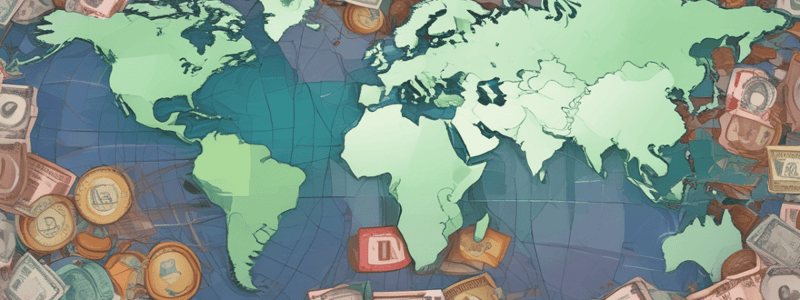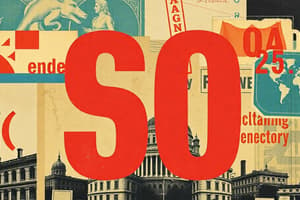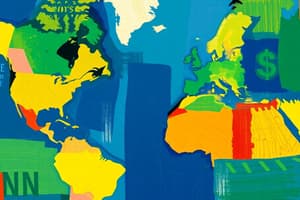Podcast
Questions and Answers
What is the primary reason why lenders require a higher interest rate when lending to a country with high political or economic turmoil?
What is the primary reason why lenders require a higher interest rate when lending to a country with high political or economic turmoil?
- To maintain money market equilibrium.
- To compensate for the risk of default on loan repayments. (correct)
- To influence the country's exchange rate expectations.
- To compensate for the expected currency depreciation.
In the Mundell-Fleming model, what is the effect of an increase in the risk premium θ on the IS* curve?
In the Mundell-Fleming model, what is the effect of an increase in the risk premium θ on the IS* curve?
- The IS* curve remains unchanged.
- The IS* curve becomes vertical.
- The IS* curve shifts to the left. (correct)
- The IS* curve shifts to the right.
What is the consequence of an expected depreciation of a country's currency on the attractiveness of holding that currency?
What is the consequence of an expected depreciation of a country's currency on the attractiveness of holding that currency?
- It depends on the country's interest rate.
- It remains unchanged.
- It becomes more attractive.
- It becomes less attractive. (correct)
In the Mundell-Fleming model, what is the consequence of an increase in the risk premium θ on the level of income Y?
In the Mundell-Fleming model, what is the consequence of an increase in the risk premium θ on the level of income Y?
Why might the central bank try to reduce the money supply in response to an increase in country risk or expected depreciation?
Why might the central bank try to reduce the money supply in response to an increase in country risk or expected depreciation?
What is the likely consequence of a fixed exchange rate on a country's monetary policy?
What is the likely consequence of a fixed exchange rate on a country's monetary policy?
Which of the following countries experienced a stock market decline of around 20% during the 1997-1998 crisis?
Which of the following countries experienced a stock market decline of around 20% during the 1997-1998 crisis?
According to the Impossible Trinity, what is the trade-off between exchange rate management and monetary policy?
According to the Impossible Trinity, what is the trade-off between exchange rate management and monetary policy?
What is the likely effect of capital outflows on a country's exchange rate?
What is the likely effect of capital outflows on a country's exchange rate?
What is the likely consequence of a currency being undervalued?
What is the likely consequence of a currency being undervalued?
In the Mundell-Fleming model, under a fixed exchange rate regime, what is the effect of monetary policy on output?
In the Mundell-Fleming model, under a fixed exchange rate regime, what is the effect of monetary policy on output?
In a fixed exchange rate regime, what is the consequence of a trade policy restriction on imports on the exchange rate?
In a fixed exchange rate regime, what is the consequence of a trade policy restriction on imports on the exchange rate?
What is the result of a fiscal expansion in a floating exchange rate regime, according to the Mundell-Fleming model?
What is the result of a fiscal expansion in a floating exchange rate regime, according to the Mundell-Fleming model?
In the context of the Mundell-Fleming model, what is the key difference between monetary policy under fixed and floating exchange rates?
In the context of the Mundell-Fleming model, what is the key difference between monetary policy under fixed and floating exchange rates?
What is the effect of import restrictions on output in a fixed exchange rate regime, according to the Mundell-Fleming model?
What is the effect of import restrictions on output in a fixed exchange rate regime, according to the Mundell-Fleming model?
What is the primary effect of import restrictions on the labor market?
What is the primary effect of import restrictions on the labor market?
Under a fixed exchange rate system, what is the role of the central bank?
Under a fixed exchange rate system, what is the role of the central bank?
What is the effect of a fiscal expansion on the exchange rate under a floating exchange rate system?
What is the effect of a fiscal expansion on the exchange rate under a floating exchange rate system?
What is the primary difference between the effectiveness of fiscal policy under fixed and floating exchange rate systems?
What is the primary difference between the effectiveness of fiscal policy under fixed and floating exchange rate systems?
What is the assumption about prices in the long run under a fixed exchange rate system?
What is the assumption about prices in the long run under a fixed exchange rate system?
Flashcards are hidden until you start studying




